🗣️ Controversies in AI and Education
Dive into varied perspectives on AI’s role in changing education and classrooms
AI is showing up in more and more corners of our lives, especially in education, and not everyone is responding the same way. Depending on who you ask, it might be the greatest learning tool we’ve ever had or a serious threat to critical thinking. Some may see opportunity, while others see disruption. And honestly, many of us are still figuring out how we really feel about it.
Just recently, Mustafa Suleyman, CEO of Microsoft AI, shared a LinkedIn post about a new meta-analysis titled “The effect of ChatGPT on students’ learning performance, learning perception, and higher-order thinking.” The post sparked a lot of reactions, but the comment section was turned off. Perhaps that says something about how charged this topic has become.
In this edition, we’ll explore the range of perspectives on AI in education, what people are saying, what’s fueling the debate, and what it might mean for the future of learning.
Here is an overview of today’s newsletter:
Upcoming workshops on project-based pedagogy and tips for integrating AI into any curriculum
A look at the diverse perspectives on AI’s role in education today
A new AI literacy framework designed for primary and secondary education
Emerging changes to assessment practices for an AI-driven world
⭐️ AI x Education Webinar Series
📢 Upcoming Webinars
AI and the Art of Learning: Project-Based Pedagogy for the Future
Friday, May 30 | 1:00 – 2:00 PM PDT
As AI transforms how we work and create, it also challenges us to rethink how we teach. What if, rather than replacing human learning, AI could help us return to what makes it meaningful: curiosity, creativity, and connection?
Join us for a thought-provoking conversation at the intersection of AI, education, and the arts. This session spotlights project-based learning as a powerful framework for helping students thrive in an AI-enhanced world. Whether you're an educator, school leader, or lifelong learner, you'll leave with new inspiration for designing hands-on, human-centered learning experiences.
In this webinar, you’ll discover:
Practical ways educators are using AI to support student-led projects and inquiry
How creativity, experimentation, and purpose can flourish in an AI-enabled classroom
Strategies for co-designing learning with students using ethical, human-first approaches
Featured Speakers:
Tara Mandrekar – Associate Director, Ourmedia: Building equitable, AI-ready learning-to-career pathways
Jorge Costa – Professor, ASU & Grammy-nominated engineer: Bridging music, learning, and emerging tech
Dan Be Kim – Edtech researcher, Harvard’s Berkman Klein Center: Developing AI fluency and moral imagination
Join the conversation and help shape a future of learning that is both intelligent and deeply human.
5 Easy Steps to Integrating AI into Any Curriculum
Wednesday, June 4 | 12:00 – 1:00 PM PDT
As generative AI tools become increasingly sophisticated, it can be challenging to know how to engage with them meaningfully in the classroom, especially without compromising academic standards or overhauling your entire course. This webinar offers a practical and adaptable framework designed to help instructors across disciplines integrate generative AI into their teaching with purpose and clarity.
In this session, we’ll walk through a clear 5-step approach to integrating AI into your teaching in ways that enhance your course goals. We’ll explore how academic integrity, ethical use, and AI-informed assessment practices can be integrated into a flexible framework that supports both instructional values and student learning.
Whether you’re curious or cautious about AI, this session is designed to be accessible: no technical expertise or major course overhaul required. Participants will leave with a ready-to-use AI Tool kit and a customizable AI Classroom Norms template to help establish clear expectations and boundaries from day one.
🚀 Practical AI Usage and Policies
📖 The Latest Perspectives on AI in Education
Educators, students, and experts currently share diverse views on AI’s role in classrooms and learning. Below are some key quotes from recent articles. Feel free to explore any of the articles to dive deeper into their insights.
Current Challenges in the Classroom
The Professors Are Using ChatGPT, and Some Students Aren’t Happy About It
“But, oh, how the tables have turned. Now students are complaining on sites like Rate My Professors about their instructors’ overreliance on A.I. and scrutinizing course materials for words ChatGPT tends to overuse, like ‘crucial’ and ‘delve.’ In addition to calling out hypocrisy, they make a financial argument: They are paying, often quite a lot, to be taught by humans, not an algorithm that they, too, could consult for free.”
- Kashmir Hill, The New York Times
Let’s Talk About ChatGPT and Cheating in the Classroom
“I think it would really be that so much of this is about communication between teachers and students, that teachers need to be very clear with students about what is and is not acceptable, what is cheating, what is not cheating, and then they need to design a curriculum that incorporates more, I would say, AI friendly assignments and work products into their education plan. Because again, what I keep coming back to is, you can't send a student home with an essay assignment anymore.”
- Katie Drummond, Uncanny Valley (WIRED)
Yes, We Are in a (ChatGPT) Crisis
“It’s time for an all-hands-on-deck discussion about how we save ourselves and our students. Only big ideas need apply. I’ll start here: we need to dramatically change the scope, structure and purpose of higher education.”
- Inara Scott, Inside HigherEd
‘An existential crisis’: can universities survive ChatGPT?
“‘AI could be the best thing that has ever happened to education but only if we get ahead of the downsides, and the most immediate downside is cheating,’ [Sir Anthony Seldon, former vice-chancellor of the University of Buckingham] says. ‘Generative AI is improving faster than the software used to detect it. It can be personalised to the users’ voice which means even a really good teacher will struggle to detect it. The great majority of students are honest but it’s really difficult, if you know that other people are cheating, for you not to do it too.’”
- Louise Eccles and Lottie Hayton, The Times
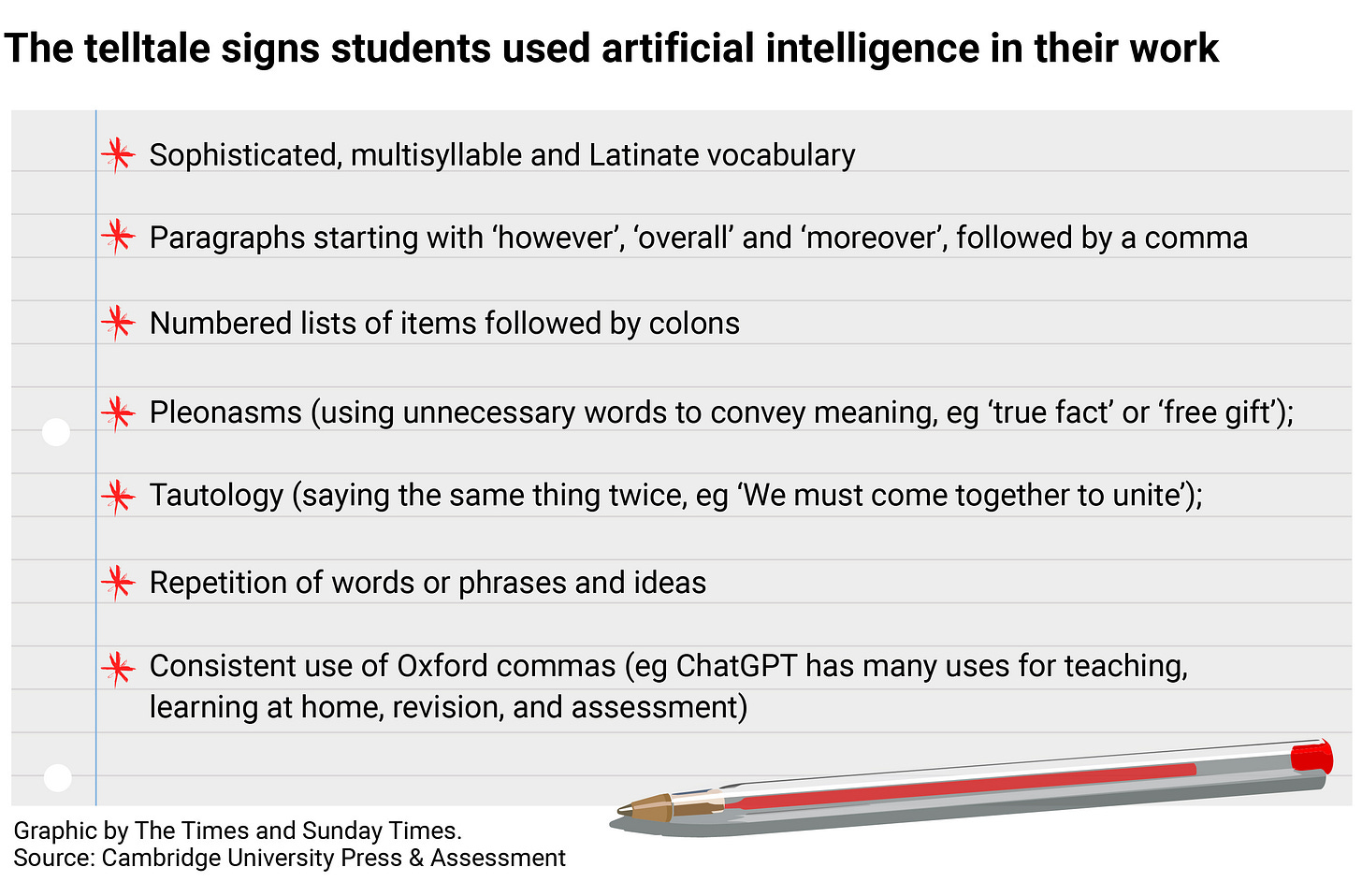
AI Will Destroy Critical Thinking
“If A.I. is carelessly incorporated all the way down to pre-K, it will be a horrible mistake. It could inhibit children’s critical thinking and literacy skills and damage their trust in the learning process and in one another.”
- Jessica Grose, The New York Times
Rethinking New Approaches to AI
AI can be a danger to students – 3 things universities must do
“Academics should model what Mishra calls ‘the dual expertise challenge’ — combining domain knowledge with critical AI literacy. This means demonstrating to students how experts engage with AI: analysing its outputs against established knowledge, identifying biases or gaps, and using AI as a tool to enhance human expertise rather than replace it.”
- Nompilo Tshuma and Sioux McKenna, The Conversation
What AI Can’t Read: Ambiguities and Silences
“A year ago, I saw artificial intelligence as a shortcut to avoid deep thinking. Now, I use it to teach thinking itself.”
- Jan Burzlaff, Inside HigherEd
‘We Have to Really Rethink the Purpose of Education’
“The skills that I think are going to be most important are how motivated and engaged kids are to be able to learn new things. That is maybe one of the most important skills in a time of uncertainty.”
- Rebecca Winthrop, The Ezra Klein Show (NYT)
Your Students Need an AI-Aware Professor
“Using AI might be the last thing you want to do. But reading up on the subject isn’t enough. Professors must actively engage with a variety of AI tools to fully understand what they can do, how they work, and why they might appeal to students.”
- Marc Watkins, The Chronicle of Higher Education
The AI Revolution is Underhyped
“That's the key thing. So my advice to you all is ride the wave, but ride it every day. Don't view it as episodic and something you can end, but understand it and build on it. Each and every one of you has a reason to use this technology. If you're an artist, a teacher, a physician, a business person, a technical person. If you're not using this technology, you're not going to be relevant compared to your peer groups and your competitors and the people who want to be successful. Adopt it, and adopt it fast.”
- Eric Schmidt (Former CEO of Google), TED
👩💻 Helpful Resources for Educators
An AI Literacy Framework for Primary and Secondary Education
The European Commission, OECD, and Code.org released their draft of the AILit Framework, a global, practical guide to AI literacy for primary and secondary education. The framework is aligned with the upcoming PISA 2029 assessment and offers clear guidance, real classroom examples, and a unified set of core AI knowledge, skills, and attitudes.
Google recently infused LearnLM directly into Gemini 2.5, which is now the world’s leading model for learning. Educators and pedagogy experts have found Gemini 2.5 Pro especially effective across diverse learning contexts, particularly in its ability to support educational goals while reflecting strong pedagogical principles. Check out its capabilities here.
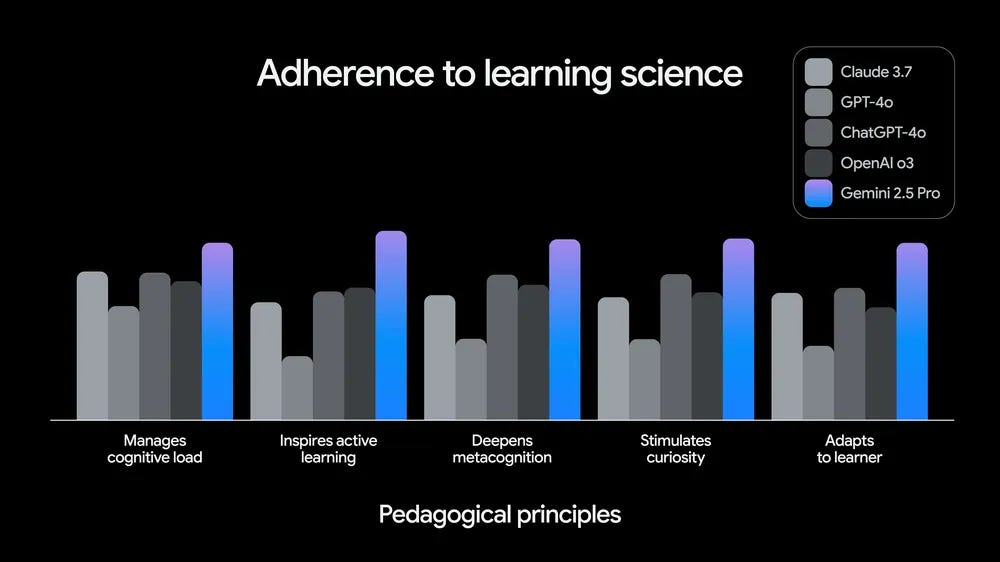
Student-Made Bots: An Educator’s Toolkit
This tutorial by Casandra Silva Sibilin from York College is a practical guide for instructors who want to support students in designing their own custom educational bots using large language models (LLMs), with no programming skills needed.
What’s inside:
A full toolkit with templates, sample bots, and a recommended semester timeline
A student-facing implementation guide
Opportunities to experiment with emerging tools like voice and video avatars
Focused support for developing ethical, responsible AI use in education
📝 Latest Research in AI + Education
Talk is cheap: why structural assessment changes are needed for a time of GenAI
Key Takeaways:
Many universities have responded to the use of GenAI in assessments by implementing discursive changes, such as instructions or rules about permissible AI use in assessments that students are free to ignore
Relying on discursive changes undermines educational integrity and assessment validity because compliance becomes optional and difficult to verify
Educators should focus on redesigning the underlying mechanics of assessment tasks (structural changes) so that desired student behavior is built into the design rather than imposed through rules
Consider shifting assessment focus from evaluating only the final product to also assessing the process students undertake to complete a task, perhaps using authenticated checkpoints
Think about assessment validity at the unit or module level by designing interconnected assessments where capabilities are demonstrated across multiple tasks throughout a course, rather than trying to "AI-proof" each single assignment
Corbin, T., Dawson, P., & Liu, D. (2025). Talk is cheap: why structural assessment changes are needed for a time of GenAI. Assessment & Evaluation in Higher Education, 1–11. https://doi.org/10.1080/02602938.2025.2503964Design of generative AI-powered pedagogy for virtual reality environments in higher education
Key Takeaways:
This study worked with teachers on developing an Intelligent Virtual Reality (IVR) approach that combines the capability of Generative AI (GAI) in generating meaningful content, and Virtual Reality (VR) in offering realistic 3D, immersive, and interactive environments, to address educational needs
Educators suggested GAI could act as realistic characters for role-play, such as a doctor or historical figure, or as a learning companion to provide support and answer questions
GAI characters were seen as offering scalable teaching tools, allowing students to ask multiple questions and potentially facilitating discussions on sensitive topics
GAI can potentially improve accessibility in teaching by creating plain language materials or allowing students to interact using their native language
Hemminki-Reijonen, U., Hassan, N.M.A.M., Huotilainen, M. et al. Design of generative AI-powered pedagogy for virtual reality environments in higher education. npj Sci. Learn. 10, 31 (2025). https://doi.org/10.1038/s41539-025-00326-1📰 In the News
The New York Times
How Miami Schools Are Leading 100,000 Students Into the A.I. Future ↗️
Key takeaways:
Miami-Dade County Public Schools, the nation’s third-largest school district, is embedding generative AI into teaching and learning, deploying Google chatbots for over 105,000 high schoolers after training more than 1,000 educators
The district reversed its initial ban on AI chatbots to help students prepare for evolving job demands and learn how to critically assess and use AI tools responsibly
Teachers are incorporating AI in classrooms for diverse uses, such as role-playing historical figures like President Kennedy or providing students with instant feedback on writing assignments
Miami school leaders view AI as just another tool in education's arsenal and emphasize the need for ethical, responsible use with guardrails, vetting processes, and frequent fact-checking
The district chose Google's Gemini for students partly because Google offered content and privacy guardrails for teenagers, including not using student input to train their AI models
Education Week
Trump Cracks Down Against Explicit AI Images. What It Means for Schools ↗️
Key Takeaways:
The Take It Down Act is the first federal law criminalizing the creation and sharing of non-consensual intimate imagery, including AI deepfakes, and requires social media platforms to remove flagged content within 48 hours
The creation and sharing of AI-generated deepfakes, particularly of minors, is a significant and growing problem in schools, facilitated by easy-to-use "nudify" apps
The law is viewed by some victims and families as potentially providing a framework for schools, but others debate its focus on punishing perpetrators versus emphasizing prevention and victim support
There is a tension between relying on criminal penalties under the new federal and state laws and the need for increased prevention and education within schools
Schools currently often lack sufficient resources, policies, and staff training needed to effectively respond to deepfake incidents and provide adequate support for victims
And that’s a wrap for this week’s newsletter! If you enjoyed our newsletter and found it helpful, please consider sharing this free resource with your colleagues, educators, administrators, and more.

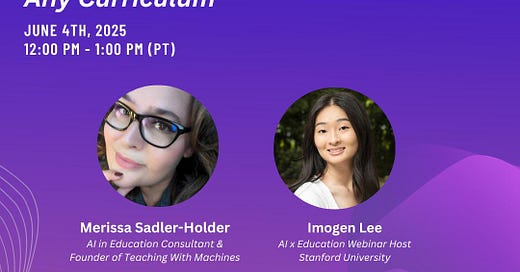


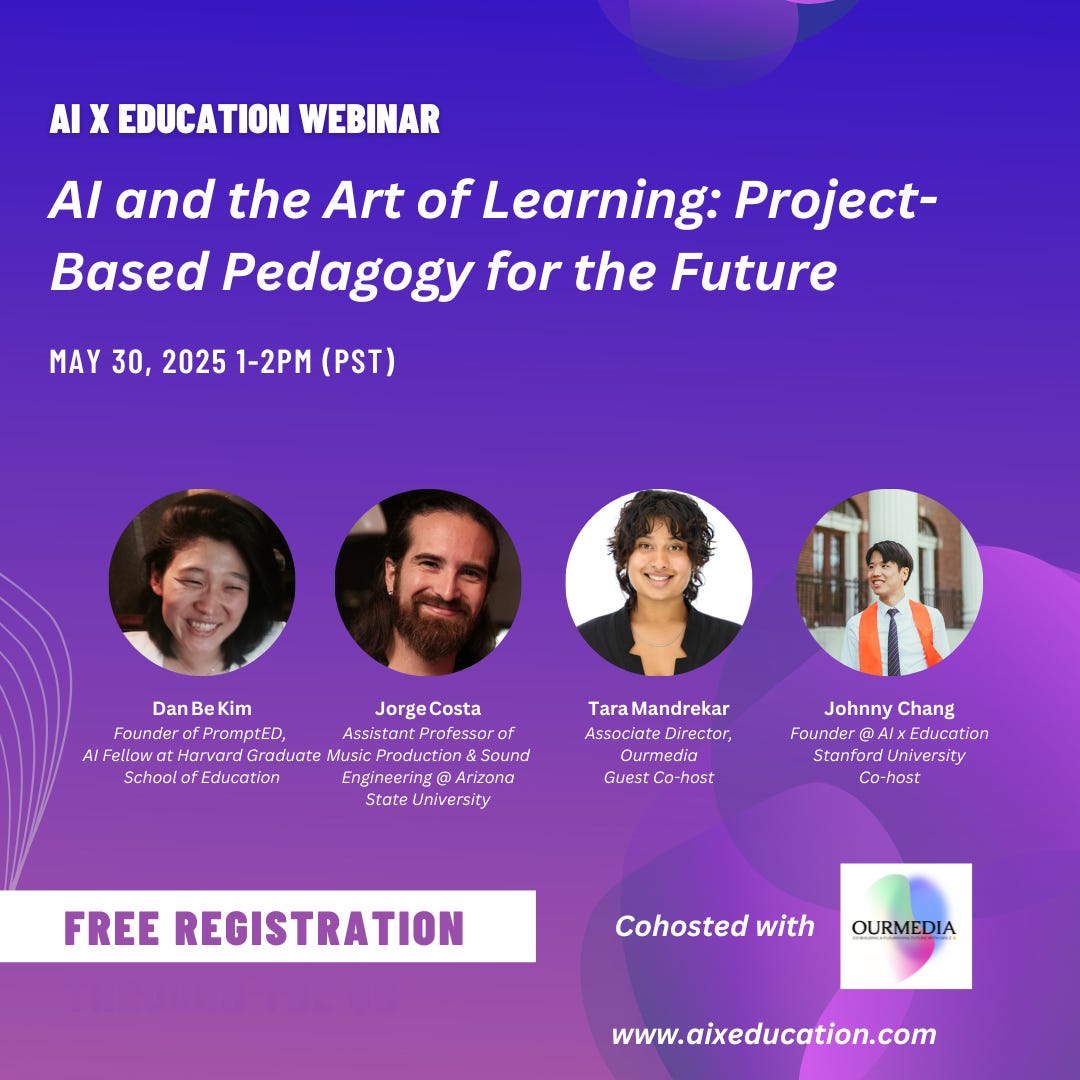


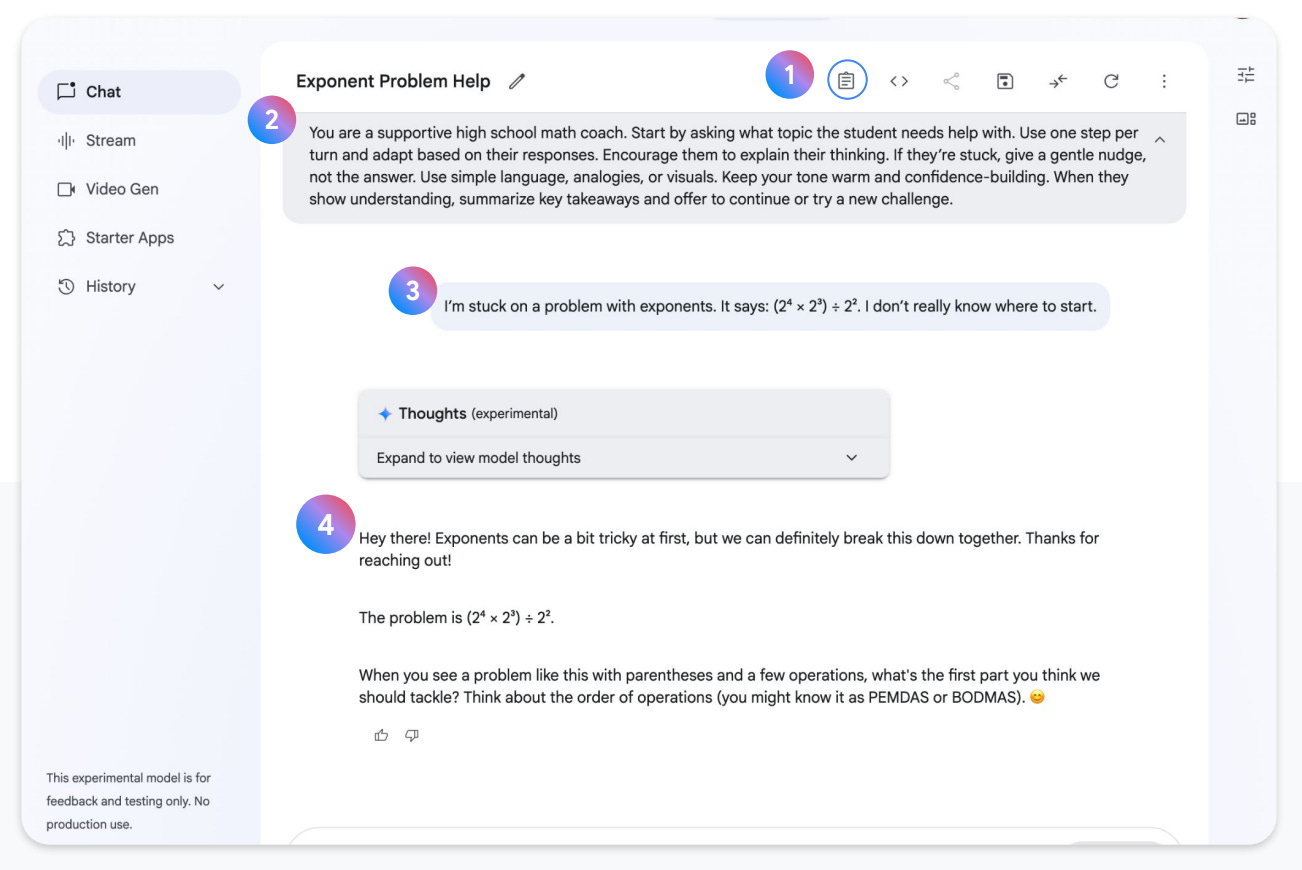
Thank you for this great round-up and including my student-made bots toolkit!
The list of things to look for from the Times (https://aixeducation.substack.com/i/164388765/current-challenges-in-the-classroom) to tell if writing is AI is... pretty weak. IMO that probably will foster mistrust more than anything else.
in the words of Vampire Weekend: "Who gives a f* about an Oxford comma?"